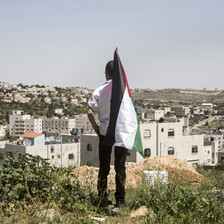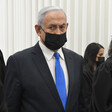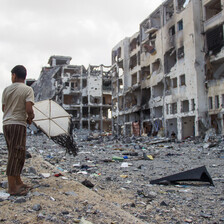The Electronic Intifada 14 April 2020

The ICC chief prosecutor has recommended that war crimes investigations in the West Bank and Gaza Strip move forward.
ActiveStillsThe US secretary of state’s threats to sanction two employees working for the chief prosecutor of the International Criminal Court and their families last month may have been the opening salvoes of a new US-Israel war against the justice body in The Hague.
Both states currently face the embarrassing specter of war crimes investigations by the court – an unprecedented challenge to their impunity. In response, they aim to disempower the court by preventing it from exercising jurisdiction in countries that are not state parties to the Rome Statute, the treaty on which the court was founded.
Should the US and Israel succeed, it would be a significant blow to the court’s independent mandate and purpose as a court of last resort for the victims of the world’s worst human rights abusers.
Their case rests mainly on the uncontested fact that the ICC does not have universal jurisdiction – meaning that not anyone can be brought before it, specifically non-parties to the Rome Statute.
The US and Israel are not among the 123 members of the ICC. But the Rome Statute does allow for the prosecution of states for alleged crimes perpetrated in territories where the court has jurisdiction.
Afghanistan – where the ICC chief prosecutor has recommended war crimes investigations that could potentially see the indictment of US officials – acceded to the Rome Statute in 2003.
The State of Palestine acceded to the Rome Statute in January 2015, accepting the jurisdiction of the court over alleged crimes committed in the West Bank and Gaza Strip.
But the State of Palestine is not able to exercise sovereignty in those territories, which have been under military occupation by Israel since their seizure during the 1967 War. Israel vehemently rejects court jurisdiction in the West Bank and Gaza Strip.
Challenge to ICC jurisdiction
Palestinians working with the court and human rights groups say that the State of Palestine’s status as a party to the Rome Statute makes it an open and shut case for court jurisdiction in the West Bank and Gaza Strip.
But because of what she calls “unique and highly contested legal and factual issues attaching to this situation, namely, the territory within which the investigation may be conducted,” Fatou Bensouda, the ICC chief prosecutor, has opened the court’s scope of territorial jurisdiction up for debate. She requested that a pre-trial panel of judges rule on the matter as a precondition to a formal investigation.
The application of court jurisdiction over non-state parties was rejected by the US, the world’s sole superpower, when the Rome Statute was being negotiated ahead of its adoption in 1998.
Israel, meanwhile, voted against the Rome Statute because it includes the transfer of populations into occupied territory among the list of “the most heinous and grievous war crimes.”
Israel’s transfer of its civilian population into West Bank settlements is expected to be a primary focus of any formal investigation the ICC may bring.
Before the coronavirus pandemic suspended business-as-usual, US Senator Ted Cruz was busy “working to garner support for a resolution that would call on the UN Security Council to bar the ICC from bringing charges against people from states who aren’t parties to the treaty that governs it,” as The Daily Beast reported in March.
“The resolution would also condemn the court for investigating American soldiers and Israeli officials,” the publication added.
Cruz reportedly presented his strategy at a private Capitol Hill meeting with the Israel lobby group AIPAC and said he expected Russia and China, which are also not parties to the Rome Statute, to support the proposed resolution.
Israel mobilizes allies
Israeli media reported that a delegation from the country traveled to the US to meet government officials in early March to hammer out a joint campaign strategy against the ICC.
The team was reportedly led by Yuval Steinitz, Israel’s energy minister and a cabinet member tasked with leading the government’s campaign to thwart an ICC investigation.
Steinitz has previously described the findings of Bensouda’s preliminary examination as “a type of ‘blood libel.’”
In the US, Israel seeks bipartisan backing against the ICC, and its delegation reportedly met Democratic lawmakers as well as White House and State Department officials.
Israel has already mobilized its allies elsewhere to argue against jurisdiction in the West Bank and Gaza Strip, with Australia, Brazil, Hungary, Austria, Germany and the Czech Republic intervening with the court to support Israel’s position, as has Uganda.
Canada also joined Israel’s cause, sending a letter to the ICC reiterating that it does not recognize a Palestinian state. The letter also reminded the court of the funding it receives from Canada, which Amnesty International said “appears to be a threat to withdraw financial support.”
Those states intervened after the ICC had invited Israel, the State of Palestine, representatives of victims, and other concerned individuals and organizations to weigh in on the issue. Dozens of submissions were made to the court before the 16 March deadline.
The Organisation of Islamic Cooperation, which includes 57 member states, and the Arab League, with 22 member states, intervened with the court in support of jurisdiction in the West Bank and Gaza Strip, as did several human rights groups.
“Disputed” territory?
Amnesty expressed its dismay over challenges by third states to ICC jurisdiction, “categorically” rejecting two of the central arguments proffered in their submissions, including the assertion that “Palestine cannot be considered a state within the scope and purpose of the Rome Statute.”
The State of Palestine acceded to the Rome Statute in 2015, which allowed it to submit war crimes claims to the court. It has also acceded as a state party to several other international treaties.
The second argument made by states challenging court jurisdiction is that the borders of the occupied Palestinian territory “are disputed,” and the Israeli-Palestinian conflict must be resolved through a political process, and not at the ICC.

ICC Chief Prosecutor Fatou Bensouda
ReutersBut as a submission on behalf of Palestinian victims of persecution observes, there may be matters that require negotiation between Israel and Palestine, “and Israel ‘disputes’ not only the existence of a State of Palestine but also the existence of the ‘Occupied Palestinian Territory.’”
That, however, the submission adds, “does not mean that such territory neither exists nor that there is not a common understanding and recognition within the international community of the scope of such territory.”
Any war crimes cases at the ICC will necessarily be narrow in scope and wouldn’t replace or preclude any political process. Bensouda’s report on the conclusion of her preliminary examination indicates that the court will not take up critical issues such as the rights of Palestinian refugees living outside the occupied West Bank and Gaza, or the myriad laws discriminating against Palestinians with Israeli citizenship.
Justice delayed
The decision to hold a preliminary examination to determine the matter of jurisdiction has come under criticism from Palestinian victims in Gaza and beyond, as well as human rights groups, who say that the move is procedurally unnecessary and only delays justice.
The submission on behalf of Palestinian victims of persecution states that the pre-trial chamber should dismiss the request by the chief prosecutor “as unnecessary and premature.”
That submission contends that addressing the question of jurisdiction before any actual case is brought to the court risks converting a legal matter into a political one.
The submission by the legal representative of Palestinian victims of persecution adds that challenges to admissibility or jurisdiction are to be made by persons who stand accused by the court, or by a “state which has jurisdiction on the grounds that it is or has investigated or prosecuted the case,” or a “state from which acceptance of jurisdiction is required.”
In other words, jurisdiction may not be challenged before charges are brought forward – “challenges are to be made to a concrete ‘case’ and not to a situation as a whole.”
Colonial legacy and failed negotiations
In their submission to the court, four Palestinian human rights groups say that “Palestine existed as a state prior to the British Mandate. Palestine’s full exercise of sovereignty over the territory of mandatory Palestine has been in abeyance as a result of successive military occupations, starting with the British occupation.”
Palestine was treated as an independent nation at the adoption of the Versailles Treaty in 1919 following the collapse of the Ottoman Empire. But instead of “reviving Palestine’s sovereignty,” as the rights groups put it, in 1947 the United Nations recommended partitioning Palestine into two “independent Arab and Jewish states.”
In the three preceding decades, British rule over Palestine had paved the way for Zionist colonization that culminated in the declaration of the State of Israel on 14 May 1948.
Hundreds of thousands of Palestinians were expelled from their homeland or internally displaced during, before and after the declaration of the Israeli state – a period known as the Nakba. Then came the Israeli seizure of the West Bank and Gaza by force in 1967, and the belligerent military occupation of those territories that followed.
These are all injustices for which there has yet to be redress. The Oslo peace process towards a two-state solution was meant to have addressed all these issues by 1999, but failed because Israel “was not acting in good faith to conclude the occupation and hand over governing authority to the Palestinian Authority,” the Palestinian human rights groups observe.
The Oslo accords signed by Israel and the Palestine Liberation Organization in the mid-1990s therefore “have fallen into [disuse],” and rights groups consider the accords “ceased to be binding in 1999, when a permanent settlement was not reached.”
The lack of a permanent settlement was not a failure of the process so much as an outcome of its design, as it allowed for the solidification of a gross power imbalance between Israel and the Palestinians, complemented by an equally unbalanced American approach, as observed by the writer Omar Karmi.
The ICC, therefore, is one of few avenues open to Palestinians to seek international redress for the many wrongs still ongoing today.
Having long ago abandoned armed resistance and declaring the Oslo process dead and buried, the Palestinian leadership that has evolved into the State of Palestine views the ICC as a key means of breaking the impunity afforded to Israel by its international allies.
As the Israeli human rights group B’Tselem notes, “Internationally, very little (if anything) has been done to compel Israel to change its policies. Instead, it enjoys generous financial benefits and international legitimacy. Israel is now railing against the prospect of actually being held accountable for some of its crimes.”
And should Israel and the US succeed in their efforts to undermine the ICC’s ability to exercise its independent mandate?
It would mean that the court would be yet another international instrument designed to serve justice to victims transformed into one to protect their abusers.
Maureen Clare Murphy is an associate editor of The Electronic Intifada.





